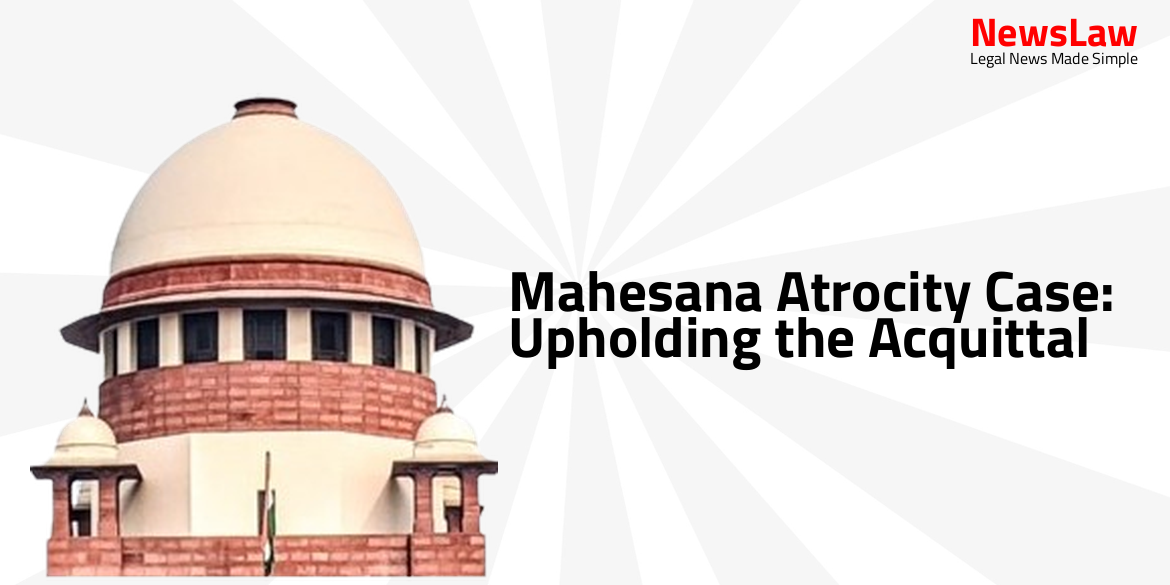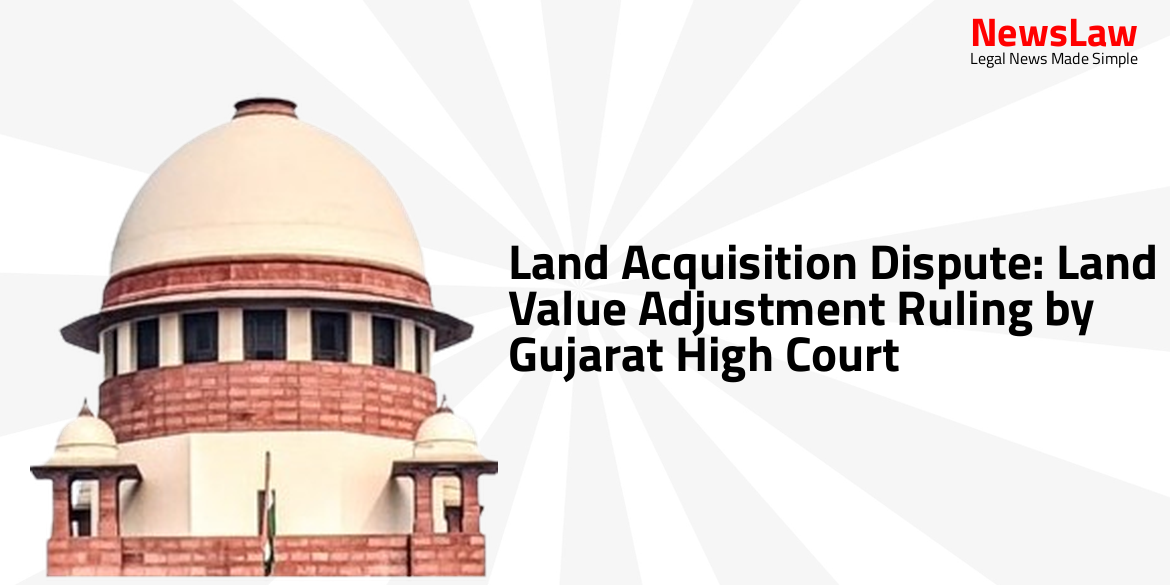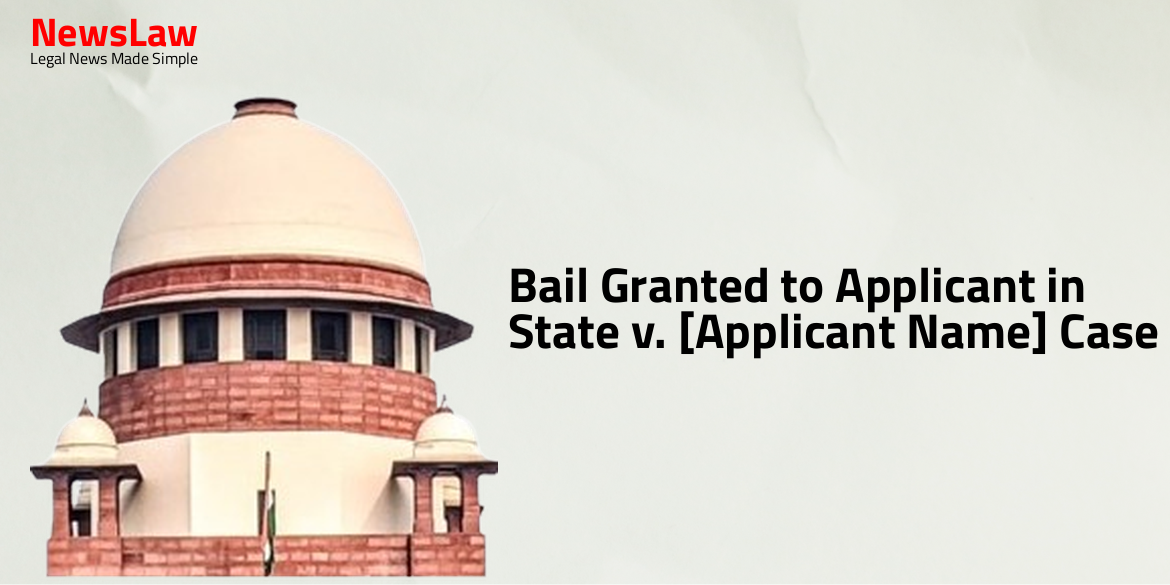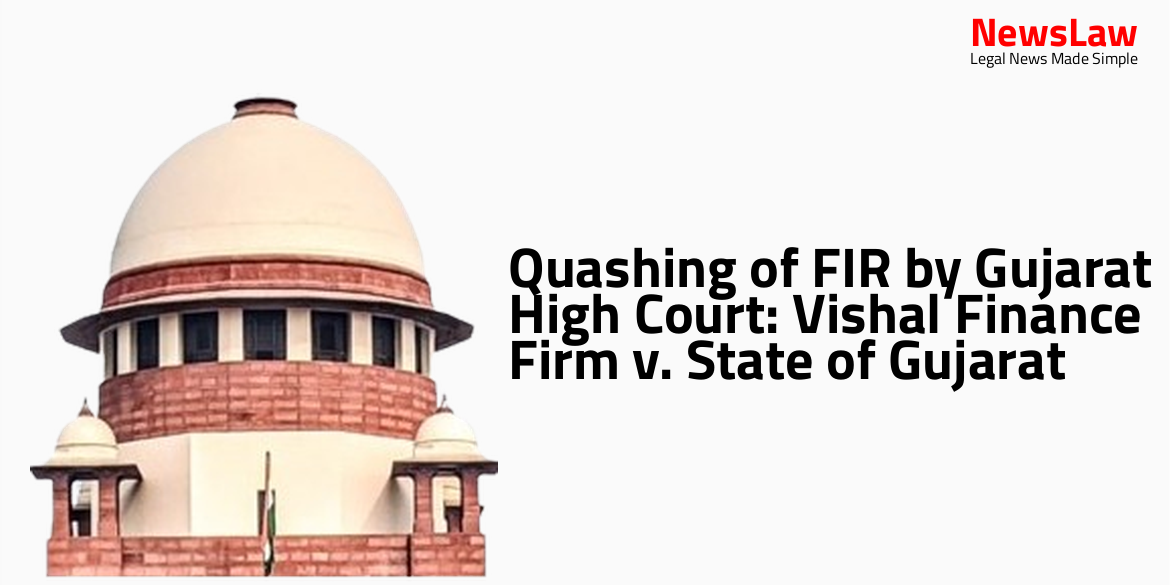In the Mahesana Atrocity Case, the Gujarat High Court has upheld the acquittal of the accused in the appeal against the Special Atrocity Case No.13 of 2007. The Court found no grounds to interfere with the previous decision, confirming the judgement of the learned Special Judge. The case involved allegations of intentional harm and threats against the complainant, filed by the Secretary of the Vankar Backward Class Cooperative Agriculture Mandali. Read on to discover the legal intricacies of this significant case. #LegalJustice #HighCourt #Acquittal
Facts
- The accused persons left their cattle for grazing in a field on 28.07.2006.
- Complainant rebuked the accused for letting their cattle graze in his field.
- Accused No.1 and Accused No.3 attacked the complainant with weapons and fist blows.
- Others intervened to save the complainant from further harm.
- Accused persons used abusive language and threatened the complainant’s life.
- Complainant filed a complaint at Kadi Police Station against the accused based on the incident.
Arguments
- The prosecution argues that the witnesses to the incident, PW-4 Ramabhai Sadabhai Makwana and PW-5 Ajmalji Dhulaji Thakore, were disbelieved by the competent Court.
- The prosecution contends that the competent Court erroneously acquitted the accused for the alleged offences by not appreciating the evidence properly.
- The prosecution asserts that the learned Judge erred in holding that the prosecution failed to prove beyond reasonable doubt that the accused intentionally caused harm to the complainant, and therefore, the accused are not liable for the offences under Sections 323, 504, and 506(2) of the IPC.
- The Additional Public Prosecutor argues that the competent Court failed to appreciate the oral evidence and witness testimonies.
- The prosecution further argues that the evidence of the Medical Officer, Dr. Bakul Prabhubhai Patel, was not properly considered by the competent Court.
- It is mentioned that in the cross-examination, the complainant stated that there was no previous scuffle with the accused and that the injuries were due to a fall, not intentional harm by the accused.
- The prosecution contests the competent Court’s interpretation of the Panchnama of the clothes and the lack of evidence regarding how the clothes were burnt.
- The lack of evidence regarding eye witnesses and the occurrence of the incident is highlighted as a point of contention.
- The prosecution believes that it has successfully proved its case beyond reasonable doubt and requests interference by the Court to overturn the acquittal of the accused.
- Reference is made to the case of M.S. Narayana Menon @ Mani Vs. State of Kerala & Anr, where the powers of the High Court in appeal against acquittal were discussed.
- The Injury Certificate at Exhibit 22 is cited as supporting the prosecution’s case, along with the Caste Certificate at Exhibit 10 which implicates the accused under the Atrocities Act.
- The prosecution mentions that the Caste Certificate at Exhibit 10 was also disbelieved by the competent Court.
- The complainant and the accused persons were present during the proceedings.
- It is argued that the acquittal of the respondents should be overturned by the Court based on the circumstances.
- The learned Advocate for the respondents argues that no error was committed by the Judge, as the complainant himself admitted to the origin of the complaint.
Analysis
- The doctor conducting the post-mortem concluded it was not possible for someone to throw a person out of a running bus.
- The High Court’s view in the appeal against the judgment of acquittal was not considered perverse and was a possible interpretation of the evidence.
- In various cases like Mookkiah and Harljan Bhala Teja, the presumption of innocence and the reinforcement of innocence upon acquittal were emphasized.
- The appellate court has the power to review and reconsider evidence in appeals against acquittals but should not disturb the finding if two reasonable conclusions are possible.
- Various legal principles regarding the powers of appellate courts in appeals against acquittals were discussed in multiple cases like Luna Ram Vs. Bhupat Singh and Chandrappa Vs. State of Karnataka.
- In acquittal appeals, the appellate court is not required to rewrite the judgment if the reasons given by the court below are just and proper.
- The decision of the High Court in treating the appeal as an appeal against acquittal, and the principles regarding necessity of substantial evidence before convicting were highlighted in the summary of the said judgement.
- The appellate Court would not interfere with the order of acquittal unless the lower Court’s approach is vitiated by manifest illegality.
- The Act aims to prevent atrocities against Scheduled Castes and Scheduled Tribes and provide relief to victims.
- The Act is intended to punish violators who inflict indignities, humiliations, and harassment on vulnerable sections of society.
- The charge-sheet in this case is for an offence under Section 3(1)(x) of the Act.
- The Court must draw a distinction between a ‘public place’ and ‘any place within public view’.
- Offences committed outside but visible from public areas are considered within public view.
- The scope of the High Court’s power in appeal against acquittal involves analyzing manifest illegality in the lower court’s decision.
- The High Court’s jurisdiction in such appeals is examined for exceeding its limits in converting acquittals into convictions.
- Existing laws like the Protection of Civil Rights Act, 1955 and the Indian Penal Code have been found insufficient to address crimes against Scheduled Castes and Scheduled Tribes.
- For an offence under the Act, the circumstances leading to guilt must be fully established by the prosecution.
- The offence under Section 3(1)(r) of the Act involves intentionally insulting or intimidating a member of a Scheduled Caste or Scheduled Tribe with the intent to humiliate.
- The key elements of the offence include intentional insult and intimidation with the aim of humiliating a member of a marginalized community.
- The act must take place in a public view for it to be considered a violation of Section 3(1)(r) of the Act.
- The complaint was written by the Secretary of the Vankar Backward Class Cooperative Agriculture Mandali.
- The complaint was filed by the complainant at the behest of the Mandali Secretary.
- No signs of beating or scuffle between the accused and the complainant were found in the Panchnama of the complainant’s clothes.
- Benefit of doubt to be granted to the accused due to the circumstances surrounding the complaint.
- Full agreement with the Trial Court’s reasoning and findings for acquitting the accused.
- The impugned Judgment and order is considered just, legal, and proper, requiring no interference from the Court.
Decision
- Bail and bail bond stands cancelled.
- Record and proceedings to be sent to concerned Trial Court immediately.
- Judgment and order of acquittal dated 08.06.2007 confirmed by the learned Special Judge, Atrocity, Mahesana in Special Atrocity Case No.13 of 2007.
- Criminal Miscellaneous Application disposed of accordingly.
Case Title: STATE OF GUJARAT Vs. RAVAL DASHRATHBHAI MAFABHAI
Case Number: R/CR.A/507/2008



